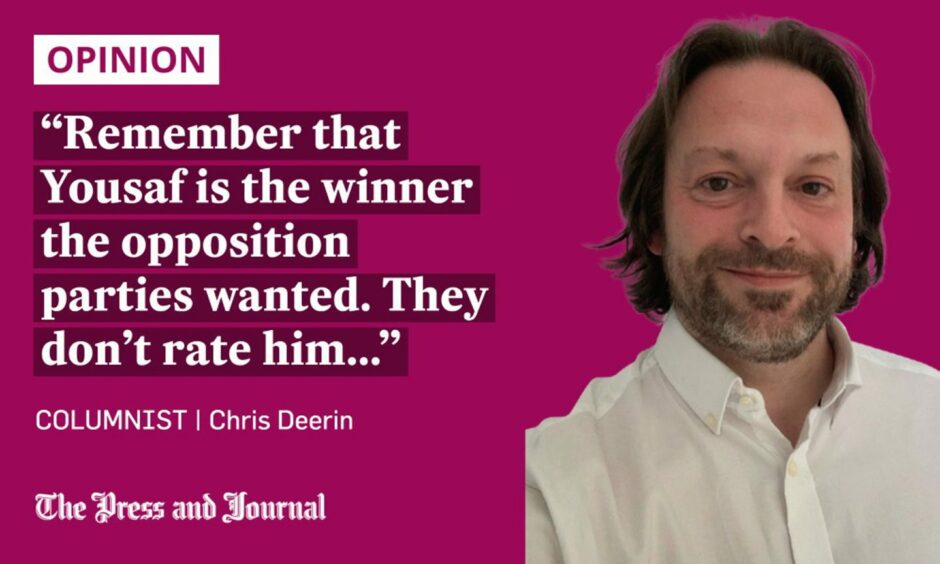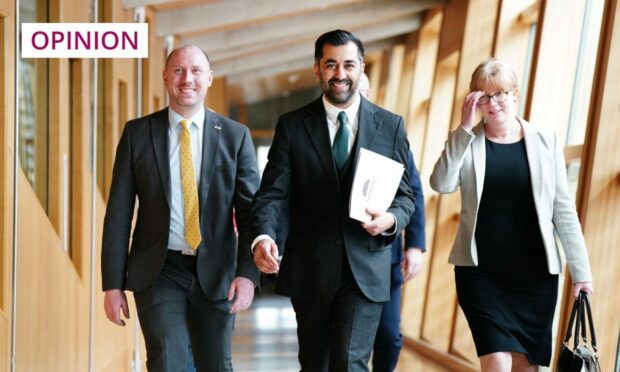In the end, the SNP decided to go for more of the same. Humza Yousaf is the party’s new leader and will today be voted in as Scotland’s first minister. For the next few years, Scots of every political persuasion must live with that.
It is a choice which will dictate how well or otherwise our schools, hospitals and economy are run. Nicola Sturgeon’s administration was poor in each of these areas, and there was little from Yousaf during the leadership election to suggest we can expect much change. The Greens will stay partners in government, for all their incompetence and odd obsessions.
Yousaf, heavily favoured by Nicola Sturgeon’s outgoing regime, only just squeaked through. On the count of first preferences, he received 24,336 votes, or 48.2%, Kate Forbes got 20,559, or 40.7%, while Ash Regan managed 5,599, amounting to 11.1%.
As no candidate achieved more than 50%, the second preferences of third-placed Regan’s supporters were redistributed. This gave Forbes 23,890 votes, or 47.9%, and Yousaf 26,032, 52.1 per cent. Turnout among the SNP’s 72,000 members was 70%, meaning just over 50,000 votes were cast. Almost two-thirds of SNP members did not support their new leader.
How will Yousaf govern? He promised in his acceptance speech to reform the NHS and local government, and support small business – there would be “no empty promises, no easy soundbites”, he insisted.
What will Humza Yousaf’s government look like?
We will be able to tell much from his Cabinet appointments. Will the same “friends of Nicola” who served for so long under Sturgeon with such a frustrating lack of ambition be reappointed, or even just shifted around a bit? Or will there be an injection of new blood into the top jobs – smart junior ministers such as Ben Macpherson and Tom Arthur have surely earned their shot and have reformist instincts. Would Yousaf give them freedom to pursue change on the scale required?

And what will he do with Kate Forbes? His main challenger for the role of first minister in the end fell agonisingly short – no surprise given the furious campaign to stop her waged by Sturgeon and her acolytes – but remains the outstanding talent in the SNP, and was the most popular candidate by far with the public. Could Yousaf give Forbes health and let her attempt to transform the NHS, or allow her to turn her intellectual firepower on the education sector? Or will he shuffle her off into a non-job? The mark of the man will be clear from this one key decision.
Yousaf is unlikely to benefit from much of a honeymoon or be given the benefit of the doubt. Polls suggest the public are not as taken by him as his supporters are. They will be looking for early signs that he is more than Sturgeon’s puppet or just a low-energy, tail-end version of his sponsor. Is this in any way a new, re-energised government? Is the SNP actually reinventing itself, or simply taking Scotland for granted?
SNP success built on dominance of the Central Belt
Remember that Yousaf is the winner the opposition parties wanted. They don’t rate him, don’t think he has leadership qualities, and believe that the Sturgeon method of governing has pretty much run its course. If the new SNP top dog continues his predecessor’s relentless prosecution of the case for independence, and proves an insipid, uninspired frontman with a timid approach to policy, then after 16 long years in office the party’s days may be numbered. Scottish Labour, especially, knows it’s now or never, and believes it’s now.
That Yousaf is a Glasgow MSP (though he actually lives in Dundee) whereas Forbes represents a Highland constituency is one of the reasons the old leadership so badly wanted him to win. The SNP’s recent success is built on its dominance of the central belt – once traditional Labour areas such as the West Coast and Fife – and polls show growing discontent there with the governing party. Labour is confident it will take back a fair number of those constituencies in next year’s general election, setting it up nicely for Holyrood 2026.
We are all relying on new first minister
Yousaf’s main immediate task, then, will be to prevent this happening. Sturgeon judged her success on electoral wins rather than on governing achievements, and the imminence of two vital contests suggests the new man will have to do the same. But the scales have fallen from many voters’ eyes – can he sustain support without notably improving the public services? Will he seem dynamic enough? Is he a figurehead for a nation?
🔴 LIVE | Selection of Scotland's next First Minister.
Watch Live as the result of the MSPs' vote on the next First Minister is announced. https://t.co/YK4kvxNnU3
— Scottish Parliament (@ScotParl) March 28, 2023
With so much at stake, and with so much left undone by Sturgeon despite her era of untouchability, these are times for a visionary battler who can drive Scotland into the future and shape its response to a changing global economy, rather than a trimmer who seeks only to stay popular. Business desperately needs a champion in Bute House, the NHS needs a major independent review that the politicians stay out of, and Curriculum for Excellence has gone badly wrong and should be rethought from the ground up.
These are not ideological points, but national emergencies. Is Yousaf up to it? Who knows. But he has won, and for now is the only game in town. For this reason, and because we are all relying on him, we must wish him well.
Chris Deerin is a leading journalist and commentator who heads independent, non-party think tank, Reform Scotland


Conversation